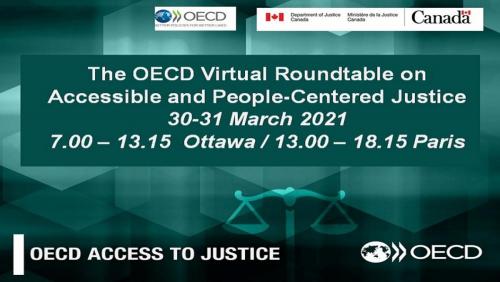
Events - Organisation for Economic Co-operation and Development (oecd.org)
Here a related article by ODI:
People-centred justice – re-setting financial priorities in OECD and low-income countries | odi.org
Some topics will include:
- Citizens/Business legal needs and trust
- Lessons learned from the health sector
- Adaptation of legal and justice services to specific group's needs
- Cross-sectional approaches to tackle access to justice challenges
- Innovations in measurement, data collection and analysis
- Digital transformation and open data
- Justice sector performance and accountability
The roundtable will be held on March 30-31, 2021, from 13:00 to 18:00 Paris / 07:00am to 1:00pm Ottawa
Roundtable Agenda: English / French
Technical workshops
The roundtable will be accompanied by two technical workshops on April 1, 2021, organised jointly with the Government of Canada:
An inclusive and people focused approach: the role of research and data in leaving no one behind (14:00 – 15:30 Paris/ 8:00 – 9:30 Ottawa).
The pandemic has highlighted the importance of data collection and evidence-based decision making in the context of managing the epidemic. The justice sector has not developed the instinct to draw on data and evidence for resourcing, policy and other decisions such as we have seen in health. The use of legal needs surveys has been well recognized across the world for drawing out information about the legal needs of people. The purpose of the workshop would be to advance the dialogue further on how data can be collected, mined and presented. Participants will explore avenues to collect and use desegregated data and information to more deeply understand the experiences of groups who have historically suffered discrimination and bias in the justice system.
A People-Focused Approach to Administrative Law (16:00 – 17:30 Paris/ 10:00 – 11:30 Ottawa).
A host of critical civil justice problems are resolved by boards, tribunals, commissions and other administrative bodies every day. These include landlord-tenant disputes, human rights complaints, employment issues and social assistance claims. The outcomes in these cases impact the fundamental well-being and dignity of individuals and families, determining whether they have a roof over their heads, can put food on the table, and live lives free of discrimination. What promising practices are emerging to help these bodies identify and respond to people’s needs? What methods are being implemented to assess these measures? The workshop will include representatives of different government departments to facilitate cross-sectoral discussions.










Add new comment